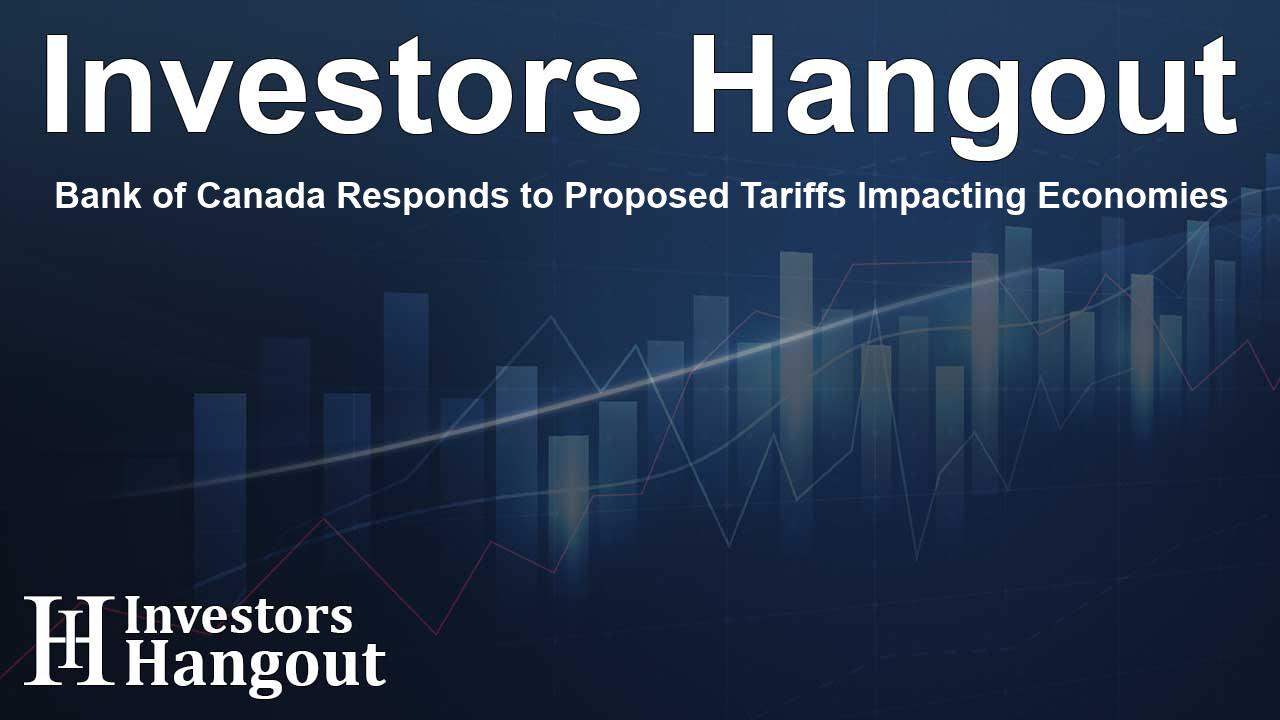Bank of Canada Responds to Proposed Tariffs Impacting Economies

Bank of Canada’s Perspective on Economic Tariffs
In recent discussions, the Bank of Canada has highlighted the significant impact that proposed tariffs could have on economies. The focus is on the forthcoming decisions made by U.S. President-elect Donald Trump, who has announced plans for a unilateral tariff that could reach as high as 25% on goods imported from Canada and Mexico.
Potential Economic Consequences
The Bank's officials assert that if these tariffs are enacted, they would likely lead to heightened inflation, dampened economic growth, and shifts in interest rate trajectories in Canada. Rhys Mendes, deputy governor of the Bank of Canada, expressed during a recent Q&A session that any economic shifts in the United States would reverberate strongly across the border. “What happens in the U.S. has a big impact on us,” he stated, underlining the interconnected nature of both economies.
The Importance of Policy Specifics
Mendes noted that the central bank is closely monitoring the developments and will adjust its economic forecasts accordingly. “At this stage, we'll be watching, and once we actually see the specifics of the policies that are enacted, we will start to incorporate those into our outlook,” he explained. The Bank has plans to update its forecasts during its upcoming monetary policy announcement.
Inflation Rates and Economic Health
During his remarks, Mendes addressed inflation concerns, stressing that the central bank aims for a stable rate around 2%. “Inflation should fade into the background again,” he suggested, indicating a return to normalcy in consumer spending and business investments, which had been hampered for years. This perspective brings hope for a rejuvenated economy where confidence is restored among consumers and entrepreneurs alike.
Rate Adjustments and Market Reactions
The Bank of Canada has actively managed its interest rates, having cut them multiple times in recent months to address economic challenges. Following adjustments, the key rate is currently set at 3.75%, with Mendes signaling that further cuts could be on the horizon if economic conditions mirror current forecasts. He indicated the necessity for rates to be less restrictive in the changing economic climate.
Forward-Looking Statements and Economic Stability
However, Mendes cautioned against allowing inflation to dip below the desired 2% benchmark. He stressed the risks associated with attempting to reverse price increases as such actions could lead to detrimental effects on demand, employment, and wage stability. “Escaping a deflationary cycle of this nature can be extremely difficult,” he remarked, highlighting the critical balance the bank seeks to maintain.
Interest rates in the market show cautious expectations regarding further significant rate alterations. Inflation measurements saw an uptick to 2% in October compared to 1.6% in September, showcasing the swirling dynamics at play. As consumers and businesses wait in anticipation, the Bank of Canada's steady management and monitoring of both domestic and international factors will be pivotal in shaping economic forecasts in the months to come.
Frequently Asked Questions
What are the proposed tariffs mentioned by the Bank of Canada?
Proposed tariffs refer to the unilateral 25% tariff on goods that U.S. President-elect Donald Trump plans to impose on Canada and Mexico.
How might these tariffs affect the Canadian economy?
The tariffs could lead to increased inflation, reduced economic growth, and changes in interest rate policies, creating challenges for economic stability.
What did Rhys Mendes say regarding inflation rates?
Rhys Mendes emphasized the importance of maintaining inflation around 2%, believing it is crucial for restoring consumer and business confidence in the economy.
What actions has the Bank of Canada taken regarding interest rates?
The Bank has reduced its key interest rate multiple times and indicated that further reductions may be necessary if economic conditions develop as anticipated.
What risks are associated with low inflation rates?
Low inflation rates can lead to decreased demand, layoffs, and depressed wages, complicating the recovery process for the economy.
About Investors Hangout
Investors Hangout is a leading online stock forum for financial discussion and learning, offering a wide range of free tools and resources. It draws in traders of all levels, who exchange market knowledge, investigate trading tactics, and keep an eye on industry developments in real time. Featuring financial articles, stock message boards, quotes, charts, company profiles, and live news updates. Through cooperative learning and a wealth of informational resources, it helps users from novices creating their first portfolios to experts honing their techniques. Join Investors Hangout today: https://investorshangout.com/
Disclaimer: The content of this article is solely for general informational purposes only; it does not represent legal, financial, or investment advice. Investors Hangout does not offer financial advice; the author is not a licensed financial advisor. Consult a qualified advisor before making any financial or investment decisions based on this article. The author's interpretation of publicly available data shapes the opinions presented here; as a result, they should not be taken as advice to purchase, sell, or hold any securities mentioned or any other investments. The author does not guarantee the accuracy, completeness, or timeliness of any material, providing it "as is." Information and market conditions may change; past performance is not indicative of future outcomes. If any of the material offered here is inaccurate, please contact us for corrections.